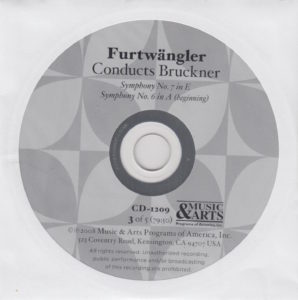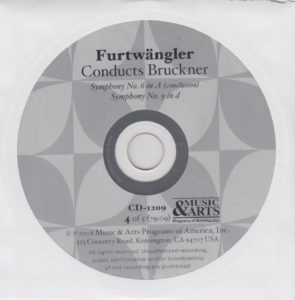 This morning, I am listening to Anton Bruckner’s Symphony No. 6 in A Major (WAB 106) interpreted by the legendary German conductor and composer Wilhelm Furtwangler (1886-1954).
This morning, I am listening to Anton Bruckner’s Symphony No. 6 in A Major (WAB 106) interpreted by the legendary German conductor and composer Wilhelm Furtwangler (1886-1954).
His orchestra is equally legendary, the Berliner Philharmoniker or – as it’s more commonly known – the Berlin Philharmonic.
I’m not going to repeat the background on Maestro Furtwangler, although I do suggest you read up on him.
I first encountered Wilhelm Furtwangler on Day 20, Symphony No. 4.
Then again on Day 28, Symphony No. 5.
Then again today. (But you already know that.)
 Both of the above links will give you a good idea who the man was and what he was known for regarding his conducting style.
Both of the above links will give you a good idea who the man was and what he was known for regarding his conducting style.
Today’s performance surprised me in that it wasn’t the complete Symphony No. 6 in A Major. It’s only 3/4 of Symphony No. 6 in A Major.
The first movement is missing.
It took me awhile to figure out that I didn’t make a mistake ripping the CDs to my hard drive. I didn’t accidentally leave out Movement I.
The fact is, it appears there isn’t a Movement I of Symphony No. 6 with Furtwangler conducting in existence. (Or, as the back of the CD box set puts it: “extant.”)
So I looked through the Furtwangler: The Legacy (108-CD) box set of complete recordings.
Sure enough. Hardly any Bruckner, and no Movement I from Bruckner’s Sixth.
From the liner notes, written by John Ardoin,
It was during 1943, in concerts in Vienna and Berlin, that Furtwangler performed for the first time in his career the Sixth Symphony of Bruckner…only the last three movements of the performances from Berlin in November 1943 have survived. Still, the historic properties of what has come down to us cannot be overlooked, especially as reflected in the fervor of Furtwangler’s conducting. His identity with the score is total, as though it had long been a deeply ingrained part of his consciousness instead of simply ‘a new experience.’
Given the historical nature of this performance (it was recorded 74 years ago!), and even how rare it is to have any of this preserved, I’m probably going to go overboard on my review and rate it more highly than it’s worth.
But, first, the objective stuff:
 Bruckner’s Symphony No. 6 in A Major (WAB 106), composed 1879–1881
Bruckner’s Symphony No. 6 in A Major (WAB 106), composed 1879–1881
Wilhelm Furtwangler conducts
Furtwangler used the “1881 Haas Edition,” according to the liner notes.
Berlin Philharmonic plays
The symphony clocks in at 36:07 (because it’s incomplete)
This was recorded in Berlin, Germany, on November 13-16, 1943
Furtwangler 57 was when he conducted it
Bruckner was 57 when he finished composing it
This recording was released on the Music & Arts Programs of America label
Bruckner wrote his symphonies in four movements. The time breakdown of this one (Symphony No. 6 in A Major), from this particular conductor (Furtwangler) and this particular orchestra (Berliner Philharmoniker) is as follows:
I: Majestoso…………………………………………………………………………………………………………00:00
II: Adagio. Sehr feierlich (Very solemnly)……………………………………………………………16:26
III: Scherzo. Nicht schnell (Not fast) — Trio. Langsam (Slowly)…………………………..7:42
IV: Finale. Bewegt, doch nicht zu schnell (With motion, but not too fast)………..12:39
Total Time: 36:07
Okay. Now, here are the subjective aspects:
 My Rating:
My Rating:
Recording quality: 3 (lots of ambient sounds like coughing, shuffling)
Overall musicianship: 5
CD liner notes: 4 (thin booklet – in English only – that’s an excerpt from John Ardoin’s book The Furtwangler Record published in 1994)
How does this make me feel: 5
Marvelous.
Every single one of these three movements, well, move me. The Adagio is especially touching. Elicits deep emotion in me, despite the coughing and shuffling from the live audience.
The Scherzo is incredibly stirring.
And the Finale…no words. Amazing.
Because all I have are three of four movements, and a running time of less than 40 minutes, I probably listened to this 3-4 times while I was typing this blog entry. And I enjoyed every listen.
I’ve been enjoying the classic German conductors (Furtwangler and Klemperer) in this leg of my Bruckner project. Especially Furtwangler. So I’m saddened that I won’t get to hear his interpretation of the Majestoso. But I balance that with the thrill of being able to hear anything at all from this 74-year-old performance, which feels electrifying to me.
Have any of you Bruckner/Furtwangler fans ever found a recording of Furtwanger’s interpretation of the Majestoso from Bruckner’s Sixth? Or is it true that it doesn’t exist anywhere?
And do you ever wonder what that crucial first movement might have sounded like in Furtwangler’s hands?
Also, can you imagine conducting the Berlin Philharmonic, in Berlin, at the height of the Second World War?
What an odd time.
One of the world’s most ruthless and crushing armies (not to mention evil ideologies) killing people by the millions…as Anne Frank, in hiding, scribbled notes into what would become The Diary Of a Young Girl…juxtaposed against something as beautiful as Furtwangler conducting this symphony.
I don’t know if I could have sat in that concert hall listening to this performance knowing people were being killed not far from me.
Or would sitting in that concert hall be essential at a time like that?
Do you ever put yourself into the lives of the composers or conductors as you listen to the music, wondering what it was like for them? (I did that for my 180 Days With Mozart And Me project several years ago. Ditto for my exploration of Beethoven’s works. I tried to imagine what it was like in their countries, at the time of year on which they completed a work, on the very day, in fact…dark, cold, or hot and muggy, candle light, etc. Primitive by today’s standards. And yet. They still created works that have lasted centuries.)
So part of my enjoyment of this performance comes from its historicity.
NOTE: There is one niggling problem I have with the Furtwangler box set that I forgot to mention the first time I cracked it open: The paper sleeves the CDs come in are sealed.
Yes. Sealed.
Which means you have to tear them open to get the CD out.

Whose bright idea was that?
This box set was remastered very well, and – despite the goofy sealed CD sleeves – is an historic and sonic Must-Have for your collection.
Just my two cents.
Take it for what it’s worth.
